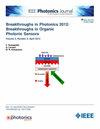基于 HAP 的光网络的并联垂直信道建模和性能分析
IF 2.1
4区 工程技术
Q3 ENGINEERING, ELECTRICAL & ELECTRONIC
引用次数: 0
摘要
本文研究了自由空间光信道的建模和基于 HAP 的无线光网络的设计。对于垂直光束传播,压力和温度梯度随高度而变化。折射率的微尺度变化会导致与高度相关的不确定性。因此,湍流造成的辐照度衰减方差在整个传播路径上不断变化。此外,湍流的形状也会从靠近地面的球形对称过渡到远离地面的高度高度不对称和各向异性。在本文中,考虑到这些高度变化,我们建议将垂直 FSO(VFSO)信道分成平行层。我们建立了一个基于衰减系数级联结构的 VFSO 信道模型。我们使用相关相屏仿真方法来验证所提信道模型的准确性。接着,结合广义指向误差模型,为串联信道建立了概率密度函数的闭式表达式。为了证明新开发的 VFSO 信道模型在基于 HAP 的光网络中的重要性,还推导出了误码率性能的闭式表达式。蒙特卡罗模拟证实,新制定的分析表达式能准确评估基于 HAP 的 VFSO 链路的误码率性能。对于面临弱湍流的基于 HAP 的光网络,与现有的竞争模型相比,新开发的表达式为 10^{-4}$ 的误码率提供了约 2 dB 的精确度。在将指向误差纳入基于 HAP 的光网络后,这一数值将增至 4 dB。在面临强波动区域的光网络中,与现有竞争模型相比,新开发的表达式在误码率为 10^{-4}$ 时可提供约 8 dB 的精度。在面临强湍流区域的基于 HAP 的光网络中加入指向误差后,也得出了类似的结论。本文章由计算机程序翻译,如有差异,请以英文原文为准。
Concatenated Vertical Channel Modeling and Performance Analysis for HAP-Based Optical Networks
In this paper, we look into the modeling of free space optical channel and design of the HAP-based wireless optical networks. For vertical beam propagation, the pressure and temperature gradients alter with height. Microscale variations in refractivity result in uncertainties that depend on elevation. As a result, irradiance fading variance caused by turbulence keeps on changing throughout the propagation path. Also, the eddies' shape transitions from spherical and symmetrical near the ground to highly asymmetrical and anisotropic at heights far away from the ground. In this paper, taking into account these variations concerning height, we propose to break the vertical FSO (VFSO) channel into parallel layers. We develop a VFSO channel model built upon the cascaded structure of fading coefficients. Correlated phase screen simulation method is used to verify the accuracy of the proposed channel model. Next, a closed-form expression for the probability density function is developed for the concatenated channel incorporating a generalized pointing error model. To demonstrate the significance of this newly developed VFSO channel model in HAP-based optical networks, closed-form expressions for bit error rate performance is also derived. Monte Carlo simulations substantiate that the newly formulated analytical expressions offer accurate assessments of the BER performance for HAP-based VFSO links. For HAP-based optical networks facing weak turbulence, the newly developed expressions provide an accuracy of about 2 dB for a BER of
$10^{-4}$ $10^{-4}$
求助全文
通过发布文献求助,成功后即可免费获取论文全文。
去求助
来源期刊

IEEE Photonics Journal
ENGINEERING, ELECTRICAL & ELECTRONIC-OPTICS
CiteScore
4.50
自引率
8.30%
发文量
489
审稿时长
1.4 months
期刊介绍:
Breakthroughs in the generation of light and in its control and utilization have given rise to the field of Photonics, a rapidly expanding area of science and technology with major technological and economic impact. Photonics integrates quantum electronics and optics to accelerate progress in the generation of novel photon sources and in their utilization in emerging applications at the micro and nano scales spanning from the far-infrared/THz to the x-ray region of the electromagnetic spectrum. IEEE Photonics Journal is an online-only journal dedicated to the rapid disclosure of top-quality peer-reviewed research at the forefront of all areas of photonics. Contributions addressing issues ranging from fundamental understanding to emerging technologies and applications are within the scope of the Journal. The Journal includes topics in: Photon sources from far infrared to X-rays, Photonics materials and engineered photonic structures, Integrated optics and optoelectronic, Ultrafast, attosecond, high field and short wavelength photonics, Biophotonics, including DNA photonics, Nanophotonics, Magnetophotonics, Fundamentals of light propagation and interaction; nonlinear effects, Optical data storage, Fiber optics and optical communications devices, systems, and technologies, Micro Opto Electro Mechanical Systems (MOEMS), Microwave photonics, Optical Sensors.
 求助内容:
求助内容: 应助结果提醒方式:
应助结果提醒方式:


